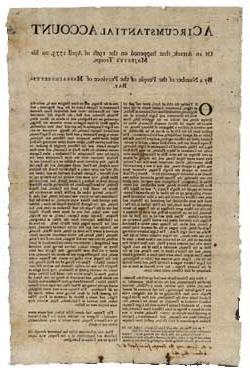A Circumstantial Account of an Attack that happened on the 19th of April 1775, on his Majesty's Troops ...
To order an image, navigate to the full
display and click "request this image"
on the blue toolbar.
-
Choose an alternate description of this item written for these projects:
- Main description
[ This description is from the project: Coming of the American Revolution ]
This account of the battles of Lexington and Concord was written by General Thomas Gage from several different testimonies. Its purpose was to counteract those accounts that were biased toward the stance of the revolutionaries, many of which claimed that British troops fired the first shot at Lexington.
"Thus this unfortunate Affair has happened"
As accounts issued by Whig printers address public curiosity, General Gage appeals for support from senior officials throughout the colonies. When his personal letters fail to have an effect on either public opinion or policy, Gage decides to write his own version of the events at Lexington and Concord. Loyalist newspapers are unable or unwilling to publish Gage's account so he recruits a sympathetic Boston printer to publish his narrative as a broadside. Gage's primary goal, like that of the Provincial Congress, is to consider testimony and prove who fired the first shot on Lexington Green. Everyone who reads his broadside will also hear that the bloody butchery on 19 April was not one-sided.
Questions to Consider
1. According to Gage, what are Lieutenant Colonel Smith's orders to his officers?
Further Exploration
2. Compare Gage's narrative with another account of the events at Lexington and Concord. What is the same in each narrative? What is different?
3.Imagine that you are a young person living in London. Write a brief essay describing your reaction to Gage's broadside. Do you find it persuasive?

